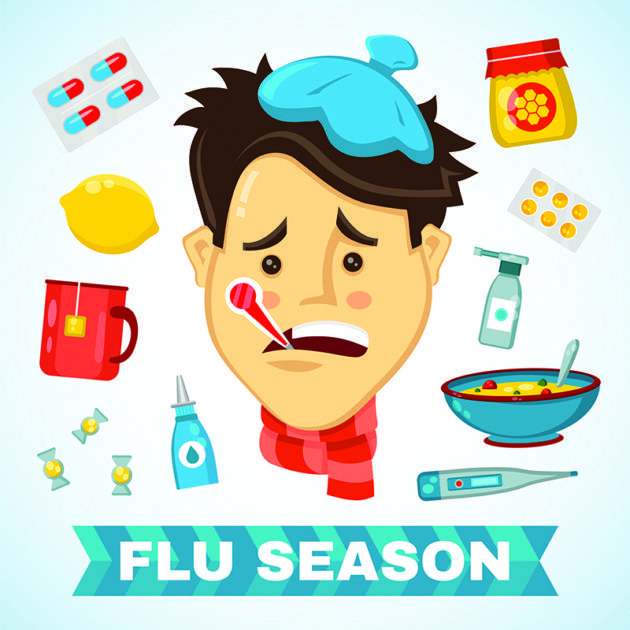What’s is flu?
The flu is an infection that can cause fever, runny nose, cough, body aches, and other symptoms. The most common type of flu is the “seasonal” flu. There are different forms of seasonal flu, for example, “Type A” and “Type B”.
All forms of the flu are caused by viruses. The medical term for the flu is “influenza”.
Is the flu dangerous?
It can be. Most people get over the flu on their own, without any lasting problems. But some people develop complication. This is because the flu can cause a serious lung infection called pneumonia, which sometimes can be deadly. That is why it’s important to keep from getting the flu in the first place.
Who is in high risk of flu?
People at higher risk of developing flu complications include:
- Extreme young – Young children under 5, and especially those under 2 years
- Extreme old – Adults older than 65
- Pregnant women and women up to two weeks postpartum
- People with weakened immune systems
- People who have chronic illnesses, such as asthma, heart disease, kidney disease and diabetes
- People who are very obese, with a body mass index (BMI) of 40 or higher
If you or your child is in one of these groups, talk to a doctor or nurse, for prevention and treatment advise.
What are the symtoms
Initially, the flu may seem like a common cold with a runny nose, sneezing and sore throat. But colds usually develop slowly, whereas the flu tends to come on suddenly. And although a cold can be a nuisance, you usually feel much worse with the flu.
Common signs and symptoms of the flu include:
- Fever over 100.4 F (38 C)
- Aching muscles, especially in your back, arms and legs
- Chills and sweats
- Headache
- Dry, persistent cough
- Extreme fatigue and weakness
- Nasal congestion
- Sore throat
Is there a test for flu?
Yes. Nasal swab is the most common rapid test. Your doctor will advise if further test is needed.
How to deal with Flu?
Most people who get the flu can treat themselves at home and often don’t need to see a doctor. If you have flu symptoms and are at risk of complications, see your doctor right away. Taking antiviral drugs within the first 48 hours after you first notice symptoms may reduce the length of your illness and help prevent more-serious problems.
How can I protect myself from flu?
Your best defense against influenza is to receive an annual vaccination.
Timing – Because the influenza virus changes (or “mutates”) slightly from year to year, you need a new influenza vaccine before each flu season. People should get the flu vaccine soon after it has become available to get the most benefit.
In the northern hemisphere, the flu season usually occurs between November and April. In the southern hemisphere, the flu season usually occurs between May and November. Flu can occur at any time of the year in the tropics.
Effectiveness – It takes about two weeks to develop flu antibodies. The vaccine usually protects 50 to 80 percent of those who are vaccinated from getting the flu.
Age group – Influenza vaccine is approved for adults and children six (6) months and above.
Because it is not 100% effective, it’s also important to take measures such as these to reduce the spread of infection:
- Wash your hands. Thorough and frequent hand-washing is an effective way to prevent many common infections. Or use alcohol-based hand sanitizers if soap and water aren’t readily available.
- Contain your coughs and sneezes. Cover your mouth and nose when you sneeze or cough. To avoid contaminating your hands, cough or sneeze into a tissue or into the inner crook of your elbow.
- Avoid crowds. Flu spreads easily wherever people congregate — in child care centers, schools, office buildings, auditoriums and public transportation. By avoiding crowds during peak flu season, you reduce your chances of infection. And, if you’re sick, stay home for at least 24 hours after your fever subsides so that you lessen your chance of infecting others.
What if I am pregnant?
The flu can be very dangerous for pregnant women. If you are pregnant, it is very important that you get the flu vaccine. You should also avoid taking care of anyone who has the flu.
If you are pregnant, call you doctor or nurse right away if:
- You might have been near someone with the flu.
- You think you might be coming down with the flu. In pregnant women, the symptoms of the flu can get worse very quickly. The flu can even cause trouble breathing or lead death of the women or her baby. That is why it is important to notify your doctor as soon as you noticed any flu symptoms. You will need an antiviral medicine for Influenza in pregnancy.











